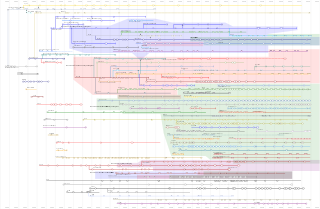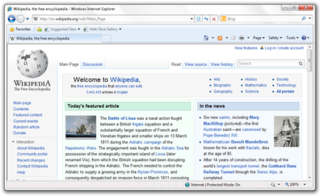Related Research Articles

Internet Explorer is a discontinued series of graphical web browsers developed by Microsoft which was used in the Windows line of operating systems. Starting in 1995, It was first released as part of the add-on package Plus! for Windows 95 that year. Later versions were available as free downloads, or in-service packs, and included in the original equipment manufacturer (OEM) service releases of Windows 95 and later versions of Windows. Microsoft spent over US$100 million per year on Internet Explorer in the late 1990s, with over 1,000 people involved in the project by 1999. New feature development for the browser was discontinued in 2016 in favor of new browser Microsoft Edge. Microsoft Teams ended support for IE on November 30, 2020, Microsoft 365 ended its support on August 17, 2021 and support for IE desktop application ended on June 15, 2022 for Windows 10 Semi-Annual Channel.
Netscape Communications Corporation was an American independent computer services company with headquarters in Mountain View, California and then Dulles, Virginia. Its Netscape web browser was once dominant but lost to Internet Explorer and other competitors in the so-called first browser war, with its market share falling from more than 90 percent in the mid-1990s to less than 1 percent in 2006. An early Netscape employee Brendan Eich created the JavaScript programming language, the most widely used language for client-side scripting of web pages and a founding engineer of Netscape Lou Montulli created HTTP cookies. The company also developed SSL which was used for securing online communications before its successor TLS took over.

A web browser is application software for accessing websites. When a user requests a web page from a particular website, the browser retrieves its files from a web server and then displays the page on the user's screen.

Mozilla Firefox, or simply Firefox, is a free and open-source web browser developed by the Mozilla Foundation and its subsidiary, the Mozilla Corporation. It uses the Gecko rendering engine to display web pages, which implements current and anticipated web standards. In November 2017, Firefox began incorporating new technology under the code name Quantum to promote parallelism and a more intuitive user interface. Firefox is available for Windows 7 and later versions, macOS, and Linux. Its unofficial ports are available for various Unix and Unix-like operating systems, including FreeBSD, OpenBSD, NetBSD, illumos, and Solaris Unix. It is also available for Android and iOS. However, as with all other iOS web browsers, the iOS version uses the WebKit layout engine instead of Gecko due to platform requirements. An optimized version is also available on the Amazon Fire TV, as one of the two main browsers available with Amazon's Silk Browser.

Avant Browser is a discontinued freeware web browser from a Chinese programmer named Anderson Che with the browser engines Trident, Gecko and Webkit the user can switch between. It runs on Windows 2000 and above, including Windows 8, Windows 8.1 and Windows 10. Internet Explorer versions 6 through 11 are supported.

A browser war is competition for dominance in the usage share of web browsers. The "first browser war," (1995-2001) pitted Microsoft's Internet Explorer against Netscape's Navigator. Browser wars continued with the decline of Internet Explorer's market share and the popularity of other browsers including Firefox, Google Chrome, Safari, Microsoft Edge and Opera.
Netcraft is an Internet services company based in Bath, Somerset, England. The company provides cybercrime disruption services across a range of industries.
MSHTML is a proprietary browser engine for the Microsoft Windows version of Internet Explorer, developed by Microsoft.

Netscape Browser is the eighth major release of the Netscape series of web browsers, now all discontinued. It was published by AOL, but developed by Mercurial Communications, and originally released for Windows on May 19, 2005.
Mozilla Firefox has features that allow it to be distinguished from other web browsers, such as Chrome and Internet Explorer.

Windows Internet Explorer 7 (IE7) is a web browser for Windows. It was released by Microsoft on October 18, 2006, as the seventh version of Internet Explorer and the successor to Internet Explorer 6. Internet Explorer 7 is part of a long line of versions of Internet Explorer and was the first major update to the browser since 2001. It was the default browser in Windows Vista and Windows Server 2008, as well as Windows Embedded POSReady 2009, and can replace Internet Explorer 6 on Windows XP and Windows Server 2003, but unlike version 6, this version does not support Windows ME or earlier versions of Windows. It also does not support Windows 7, Windows Server 2008 R2 or later Windows Versions.

Microsoft developed 11 versions of Internet Explorer for Windows from 1995 to 2013. Microsoft also developed Internet Explorer for Mac, Internet Explorer for UNIX, and Internet Explorer Mobile respectively for Apple Macintosh, Unix, and mobile devices; the first two are discontinued but the latter runs on Windows CE, Windows Mobile, and Windows Phone.

Microsoft Internet Explorer 6 (IE6) is a graphical web browser developed by Microsoft for Windows operating systems. Released on August 24, 2001, it is the sixth, and by now discontinued, version of Internet Explorer and the successor to Internet Explorer 5. It was the default browser in Windows XP and Windows Server 2003 and can replace previous versions of Internet Explorer on Windows NT 4.0, Windows 98, Windows 2000 and Windows ME but unlike version 5, this version does not support Windows 95 or an earlier version. IE6 SP2+ and IE7 were only included in or available (IE7) for Windows XP SP2+.

The Mozilla Corporation is a wholly owned subsidiary of the Mozilla Foundation that coordinates and integrates the development of Internet-related applications such as the Firefox web browser, by a global community of open-source developers, some of whom are employed by the corporation itself. The corporation also distributes and promotes these products. Unlike the non-profit Mozilla Foundation, and the Mozilla open source project, founded by the now defunct Netscape Communications Corporation, the Mozilla Corporation is a taxable entity. The Mozilla Corporation reinvests all of its profits back into the Mozilla projects. The Mozilla Corporation's stated aim is to work towards the Mozilla Foundation's public benefit to "promote choice and innovation on the Internet."
Norton 360, developed by Symantec, is an “all-in-one” security suite for the consumer market.

Windows Internet Explorer 8 (IE8) is a web browser for Windows. It was released by Microsoft on March 19, 2009, as the eighth version of Internet Explorer and the successor to Internet Explorer 7. It was the default browser in Windows 7 and Windows Server 2008 R2 and can replace previous versions of Internet Explorer on Windows XP, Windows Server 2003, Windows Vista and Windows Server 2008 but unlike version 7, this version does not support Windows Server 2003 SP1 or an earlier version.

Mozilla Firefox 2 is a version of Firefox, a web browser released on October 24, 2006 by the Mozilla Corporation.
SmartScreen is a cloud-based anti-phishing and anti-malware component included in several Microsoft products, including operating systems Windows 8 and later, the applications Internet Explorer, Microsoft Edge. SmartScreen intelligence is also used in the backend of Microsoft's online services such as the web app Outlook.com and Microsoft Bing search engine.
References
- Deepnet builds on Explorer's functionality for file sharing. New Media Age [serial online]. July 22, 2004:7-7. Available from: Business Source Complete, Ipswich, MA. Accessed April 25, 2009
- Deepnet Explorer releases password hashing counter measures. Internet Business News (April 14, 2005): NA. Computer Database. Gale.